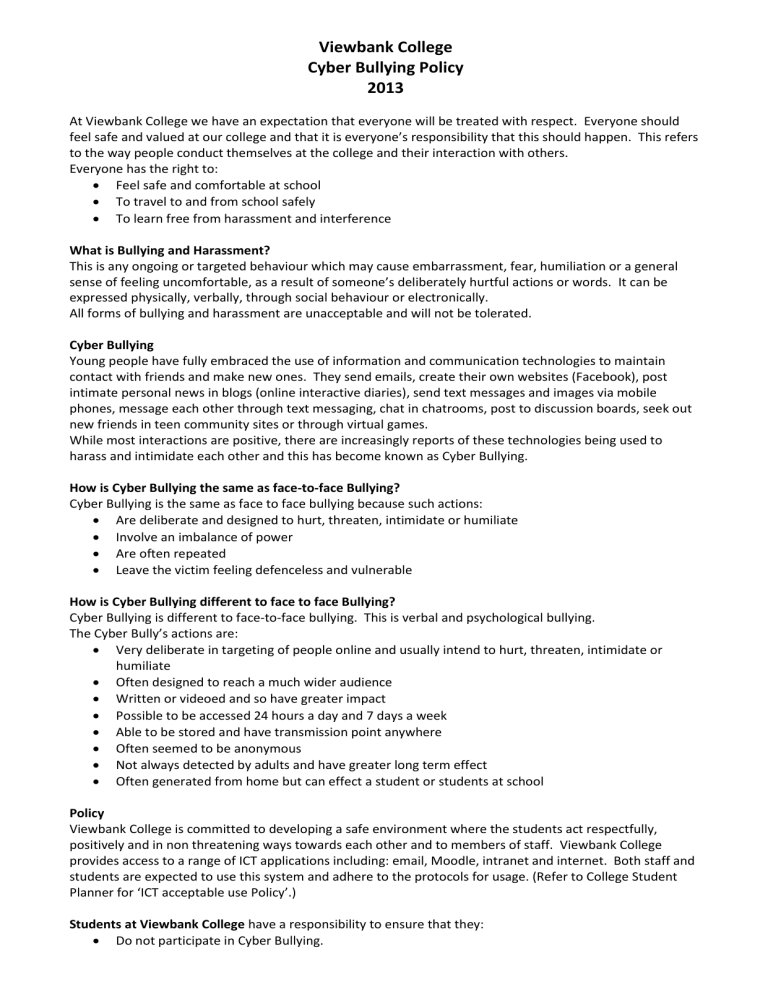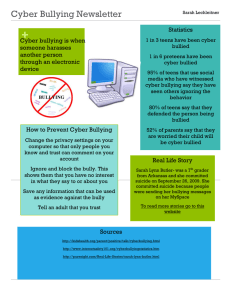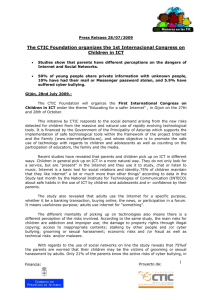Cyber Bullying Policy

Viewbank College
Cyber Bullying Policy
2013
At Viewbank College we have an expectation that everyone will be treated with respect. Everyone should feel safe and valued at our college and that it is everyone’s responsibility that this should happen. This refers to the way people conduct themselves at the college and their interaction with others.
Everyone has the right to:
Feel safe and comfortable at school
To travel to and from school safely
To learn free from harassment and interference
What is Bullying and Harassment?
This is any ongoing or targeted behaviour which may cause embarrassment, fear, humiliation or a general sense of feeling uncomfortable, as a result of someone’s deliberately hurtful actions or words. It can be expressed physically, verbally, through social behaviour or electronically.
All forms of bullying and harassment are unacceptable and will not be tolerated.
Cyber Bullying
Young people have fully embraced the use of information and communication technologies to maintain contact with friends and make new ones. They send emails, create their own websites (Facebook), post intimate personal news in blogs (online interactive diaries), send text messages and images via mobile phones, message each other through text messaging, chat in chatrooms, post to discussion boards, seek out new friends in teen community sites or through virtual games.
While most interactions are positive, there are increasingly reports of these technologies being used to harass and intimidate each other and this has become known as Cyber Bullying.
How is Cyber Bullying the same as face-to-face Bullying?
Cyber Bullying is the same as face to face bullying because such actions:
Are deliberate and designed to hurt, threaten, intimidate or humiliate
Involve an imbalance of power
Are often repeated
Leave the victim feeling defenceless and vulnerable
How is Cyber Bullying different to face to face Bullying?
Cyber Bullying is different to face-to-face bullying. This is verbal and psychological bullying.
The Cyber Bully’s actions are:
Very deliberate in targeting of people online and usually intend to hurt, threaten, intimidate or humiliate
Often designed to reach a much wider audience
Written or videoed and so have greater impact
Possible to be accessed 24 hours a day and 7 days a week
Able to be stored and have transmission point anywhere
Often seemed to be anonymous
Not always detected by adults and have greater long term effect
Often generated from home but can effect a student or students at school
Policy
Viewbank College is committed to developing a safe environment where the students act respectfully, positively and in non threatening ways towards each other and to members of staff. Viewbank College provides access to a range of ICT applications including: email, Moodle, intranet and internet. Both staff and students are expected to use this system and adhere to the protocols for usage. (Refer to College Student
Planner for ‘ICT acceptable use Policy’.)
Students at Viewbank College have a responsibility to ensure that they:
Do not participate in Cyber Bullying.
Do not use mobile phones, cameras or other digital devices to record audio and visual material that is not authorised as part of the school curriculum program.
Do not invade the privacy of students, staff and members of the school community through any
unauthorised contact, recording or filming.
Do not create or pass on inappropriate information through digital media or other ICT means.
Report incidents of Cyber Bullying to a member of staff
If someone is being victimised by Cyber Bullying, give support and advise them to talk to an adult.
If the bullying originates on the intranet, turn the screen off and then alert your teacher.
Staff at Viewbank College have the responsibility to ensure that:
All forms of Cyber Bullying are prohibited at Viewbank College
Staff are aware of Cyber Bullying and are able to identify and look for signs of occurrence among the students
Students are aware of the consequences of Cyber Bullying
A code of conduct is in use for ICT, including computers and mobile phones, whilst on the school premises
Appropriate programs and tutorials are implemented. The use of "Cybernetrix" and "Wise up to IT" programs have been created to educate students about safe cyber communication and usage.
All cases of Cyber Bullying are reported to the classroom teacher, Year Level Coordinator, Student
Welfare Counsellor or Assistant Principal and responded to promptly.
There is supervision of ICT that is effective for monitoring and deterring Cyber Bullying.
Parents have a responsibility to ensure that they:
Are aware of Cyber Bullying and are able to identify and look for signs of occurrence if their child is distressed by material sent to them.
Check if there are recurrences of such materials.
Do not participate, encourage or support Cyber Bullying.
Need to understand that if their child engages in Cyber Bullying outside the school grounds and it impacts on another child’s learning or well being within the College, then the College will proceed with disciplinary actions.
Positive online Behaviour:
What is positive online behaviour?
As a digital technology and internet user, you have the right to be respected online. You also have the responsibility to interact appropriately with others in cyberspace and to respect them in return.
To keep safe online and have positive experiences, remember these simple steps:
Messaging and email
Never share your passwords, no matter how much you trust your friends.
Don’t reply to nasty messages. Block senders of inappropriate or unpleasant messages, or delete the person if they are in your contact list.
Set your account to offline, even when you are online.
Save all emails and turn on history in your Messaging service to keep a record of all messages. Print out the history.
Create a screen contact capture of any negative by pressing “PrtSc” on your keyboard. Paste the message into a word processing program and save a copy as well as printing a copy as evidence.
Go to the program’s website [eg email or messaging site]. Find the help menu and type in ‘how to report abuse.’ Follow the guidelines.
Create a new email account to contact friends.
Report the sender to the messaging or email provider.
Remember that unknown, private and anonymous communication can be traced.
Gaming
Leave or avoid the gaming site.
Ignore nasty messages or do not reply.
Change your profile’s ID.
Delete the person if they are in your gaming list.
Capture screen dumps of messages.
Find out if the chat rooms or gaming site you are using has a moderator, and if so, report the abuser.
Go to the program website, find the ‘help’ link and type ‘how to report abuse’ and search.
Mobile Phone
Don’t give out your mobile number to people you don’t know or trust.
Don’t reply to nasty messages.
Turn your phone off or onto silent when it is bed time.
Save all offensive or bullying messages as evidence. Give this information to your parents or to
College staff.
Tell a trusted adult or call the Cybersafety Contact Centre – 1800 880 176
Contact your telecommunications carrier to block known numbers.
Who do I contact for help?
If you feel you, or someone you know, is being bullied online, there are a number of ways to get help.
Try contacting:
Your friends
Teachers
Parents
Local Police
Phone support
A trusted adult
Kids Help Line -1800 55 1800
Local welfare groups
Cybersafety Contact Centre -1800 880 176
Strategies of the College to deal with Cyber Bullying.
If the Student Code of Conduct has been violated, responses will depend on the severity of the issue.
These may include:
Consultation and counselling
It is hoped that the cycle of Cyberbullying can be successfully broken at this point and both the concerns and problems of the victim and perpetrator can be successfully addressed
School detention
Parent contact
Parent Interview and student contracts
An Official College Warning
Suspension and counselling as per DEECDT guidelines
Involvement of other external agencies( psychologists, police ,etc as required)
Cyber Bullying - major escalation
If you fear that you are at risk of physical harm through Cyber Bullying, the police can become involved.
Report it by dialling 000. With most cases of Cyber Bullying, police require strong evidence. Reports can be made to local police.
To address a significant issue:
Contact your telecommunication carrier to block known numbers.
Contact the police or Crime Stoppers:- o www.crimestoppers.com.au
o Tel: 1800 333 000
Contact the Telecommunications Industry Ombudsman:- o o www.tio.com.au
Tel: 1800 062 058




